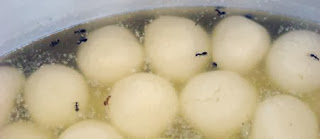Insects and flies found in sweets at
one of the food processing chambers in a hotel in Dimapur. (Morung photo)
Food safety officials find many
discrepancies
Food safety officials along with police on Wednesday visited restaurants, hotels, bakeries, lounges and eating houses along Circular Road, Dimapur to inspect facilities and to verify that safe food handling practices are followed. During the inspection, it was found that the food being handled processed, manufactured or stored and the persons handling them did not conform to the sanitary and hygienic requirements. Most of the places did not adhere to the basic hygienic requirement of wearing gloves, masks, aprons or sanitary paper headgears.
Food safety officials along with police on Wednesday visited restaurants, hotels, bakeries, lounges and eating houses along Circular Road, Dimapur to inspect facilities and to verify that safe food handling practices are followed. During the inspection, it was found that the food being handled processed, manufactured or stored and the persons handling them did not conform to the sanitary and hygienic requirements. Most of the places did not adhere to the basic hygienic requirement of wearing gloves, masks, aprons or sanitary paper headgears.
However, in places that were inspected later, the employees were found hygienically prepped and working, when the food safety inspectors arrived. However when employees were asked if they wore gloves and headgears daily while working, the response was negative; making it obvious that they were tipped-off about the inspection going on. Many of them said they were asked to prep up only few minutes earlier, before the inspection team arrived. In most of the hotels, newspapers were used instead of butter papers at the bottom of cakes and other items. Food safety inspectors cautioned the restaurants and hotels against the use of newspapers as its ink contains substances that might cause substantial health hazards.
During the inspection, it was found that the salt used in one particular restaurant did not have any iodine content. In other places, the inspection team seized items that were either expired or did not have the manufactured date. The seized items included coconut powders, dry fruits, pasta maga & mamma giri, cardamom and soya sauce. The food safety inspectors took note of ash trays provided on tables in restaurants and hotels despite such places being declared no smoking zones.
Sentong Jamir, Food Safety Officer (health department) under Chief Medical Officer Dimapur has asked all food manufacturing units to print food safety license or registration numbers on all labels of their produce by December 6. The manufacturing units include home-made processed foods for sale like meat packets and pickles.
Managers of some hotels and restaurants were asked to report to the office of CMO Dimapur on Thursday to cross check their licenses.


